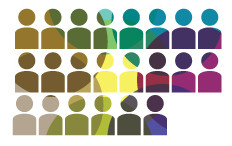 As 2015 wound to a close last month, I had the opportunity to reflect on our accomplishments and challenges at Philanthropiece. My role in the organization allows me to flow in and out of each of our three core programs, gaining valuable insight each time. Sometimes these programs can seem disparate and unrelated. The subject matter, geographical locations, and populations with whom we work are quite diverse. But in 2015, more than any other time, I began to see a clearer picture emerge – one of the broader ecosystem in which we operate, and where each program is connected to the others at their roots.
As 2015 wound to a close last month, I had the opportunity to reflect on our accomplishments and challenges at Philanthropiece. My role in the organization allows me to flow in and out of each of our three core programs, gaining valuable insight each time. Sometimes these programs can seem disparate and unrelated. The subject matter, geographical locations, and populations with whom we work are quite diverse. But in 2015, more than any other time, I began to see a clearer picture emerge – one of the broader ecosystem in which we operate, and where each program is connected to the others at their roots.
I drew inspiration from a specific conversation with Alex Flores, our guide from the NGO Noroeste Sustentable, in Baja California. As he escorted us around the community of el Mangle, he spoke about his work with systems thinking. Distinct problems in this community were actually quite interconnected. Government policies lead to unemployment, which leads to overfishing in the bay, which leads to environmental degradation, which leads to health issues, and on and on. Alex stressed that it was senseless to use the same logic that created the problem to solve it – we must understand the system and then create a new one.
This message resonated again as I met social entrepreneurs from the Unreasonable Institute who changed their entire approach to business in order to design creative, alternative solutions to social and environmental problems. My thinking coalesced around this theme during the YGL Insight Trip to the Southwest US. I met activists and advocates confronting environmental degradation, GM crops, poverty, indigenous people’s rights, and an abusive and unjust immigration system. These seemingly distinct issues share a common root cause: our current economic and political system is antithetical to the rights of communities and nature. So instead of selfish, profit-driven motives, these individuals all spoke of the power of community, creativity, collaboration, and communication. All fought for justice. All fought for a new system.
These experiences changed the way I see our programs and their relationships to each other. By viewing our work through a social justice lens, we can consider the systems that created the issues we address, and also the potential systems that could be used to solve them. Our programs contain in their DNA the values that we hold at Philanthropiece that are the same I witnessed in the myriad activists, thinkers, entrepreneurs, and community leaders I met this year. We cultivate deep, authentic relationships. We believe in collaboration and community. In Chajul, Guatemala, we are not only offering scholarships and following the trend of social entrepreneurship – we consider the root causes of poverty and inequality in Guatemala and investigate alternative models to the economic and political paradigms that created the status quo. In Baja California Sur, Mexico, we are not simply following the newest trend in the world of microfinance – we explore how community banks unite communities, empower change agents, and push back against the traditional world of finance to put more power into the hands of communities. In Boulder, Colorado, we do not simply run a youth leadership program – we push students to challenge the very foundations of injustice in our society and provide the building blocks they will need to pursue lives dedicated to making positive change.
In 2016 I hope to engage with our programs in a more interconnected and critical way. I want our entire organization to reflect on its role in the current systems that have oppressed too many people. Our work is dedicated to shifting the momentum to a more inclusive and just society, and all three of our programs contribute something unique to this initiative.
 Jake Matlak is Philanthropiece’s Associate Director of Programs. He is pictured here in Kapeel Ixil, one of the social enterprises engaged in our incubator in Chajul, Guatemala.
Jake Matlak is Philanthropiece’s Associate Director of Programs. He is pictured here in Kapeel Ixil, one of the social enterprises engaged in our incubator in Chajul, Guatemala.

